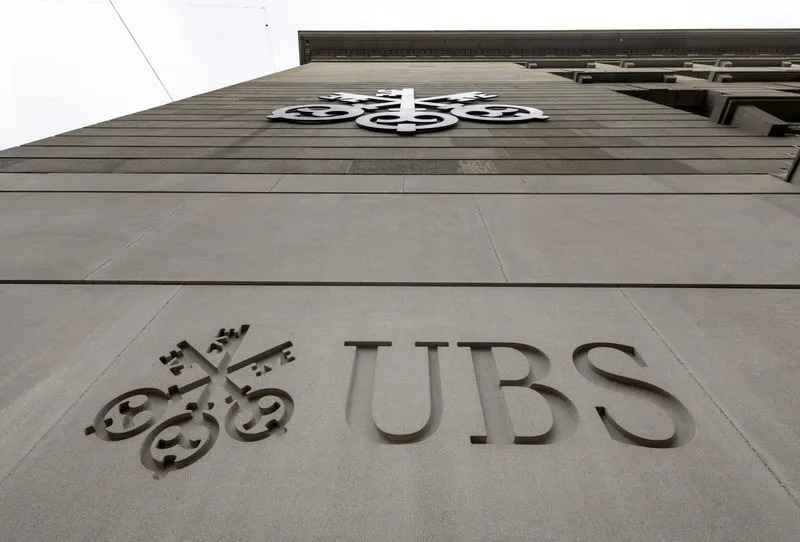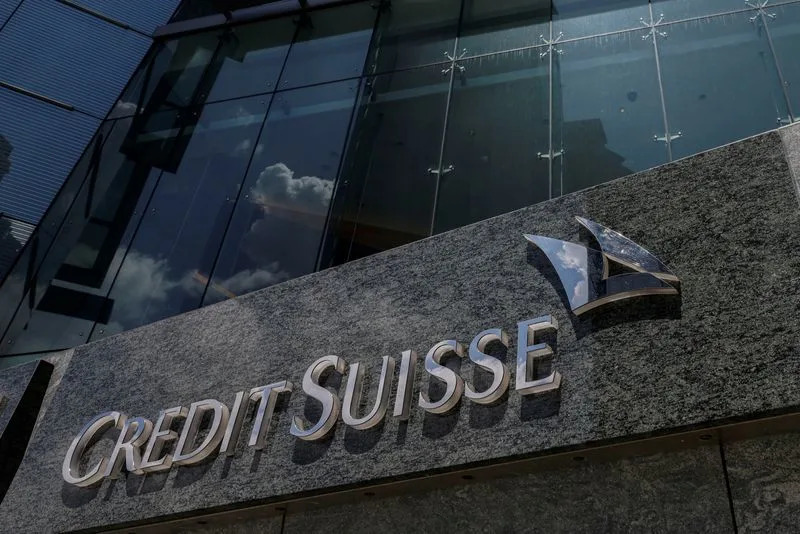Nell Mackenzie
Mon, October 2, 2023

FILE PHOTO: A logo of Swiss bank UBS is seen in Zurich
By Nell Mackenzie
LONDON (Reuters) - Hedge funds using computers to trade equities are expecting to start selling to the tune of $20 billion to $30 billion in the next two weeks given retreating stock markets, a UBS note seen by Reuters shows.
Hedge funds using algorithms to follow market trends have turned neutral from bullish on stocks, the UBS note said.
The bank anticipates as much as $30 billion of outflows will soon hit markets, potentially exacerbating the downward move in shares, as these hedge funds start selling stock to follow the recent negative performance.
This will be the first time these hedge funds will be net short equity markets since November 2022, the bank said.
U.S. stocks fell 3.6% in the July-September period, their first quarterly decline of 2023, as investors grappled with the prospects of interest rates remaining higher for longer and rising oil prices added to inflation worries.
CTAs, or commodity trend advisers, are different from stock picking hedge funds in that they follow the movement of an equity, rather than forming an idea as to whether its stock price is too high or low.
This is why their trades often lag market moves, as a downward trend takes time to establish.
The size of the U.S. stock market is estimated to be $46.2 trillion, according to the Securities Industry and Financial Markets Association.
CTAs have been long the dollar and are short long term U.S. Treasuries. These hedge fund have continuously bought the dollar through September, said UBS, estimating the total amount of buying to add up to $60 to $70 billion.
Currency trading hit a record $7.5 trillion-a-day Bank for International Settlements said in September 2022, with 88% of volumes including a pairing with the dollar.
(Reporting by Nell Mackenzie; Editing by Dhara Ranasinghe and Alison Williams)
UBS says reports of DOJ probe into Russia sanctions evasion are wrong
Eva Rothenberg, CNN
Sat, September 30, 2023

Fabrice Coffrini/AFP/Getty Images
Swiss multinational investment bank UBS says it is not aware of a probe by the US Department of Justice into suspected compliance-related missteps by its subsidiary Credit Suisse that reportedly allowed Russian clients to skirt sanctions.
“The recent reporting on an alleged probe by the US Department of Justice into sanctions-related compliance failures at Credit Suisse and UBS is inaccurate. We’re not aware of such a probe,” UBS told CNN in a statement. “UBS and CS have significantly and proactively reduced their Russia-related exposure.”
According to a person familiar with the matter, UBS has been in touch with the DOJ regarding the reported probe.
The bank’s reaction comes on the heels of a Bloomberg report, which cited anonymous people familiar with the matter and asserted the Justice Department had briefed lawyers for UBS (UBS) about Credit Suisse’s alleged involvement in sanctions violations.
CNN reached out to the Justice Department for comment but has not received a response.
The Swiss Bankers Association, a group of the country’s financial institutions, estimated in July more than $200 billion in Russian money has been stashed in Swiss banks. Drew Sullivan, co-founder of the Organized Crime and Corruption Reporting Project, told the Commission on Security and Cooperation in Europe in July he thinks “the often-mentioned figure of $200 billion in Russian money in Swiss banks is a gross underestimation.”
The commission, also known as the US Helsinki Commission, had called the July hearing over questions involving sanctions evasion and money laundering as Russia continues its attack on Ukraine.
“Part of our strategy in winning the war for Ukraine, is to isolate and put sanctions on Russia,” Sen. Ben Cardin, a Democrat from Maryland and co-chair of the commission, said at the hearing. “Those sanctions are only as effective as we are able to make sure that they are enforced. And we have seen the Russian economy surviving better than we thought it would. Part of that has been the laundering of dirty money in Switzerland.”
UBS shares plummeted on the news Wednesday morning. The Swiss Stock Exchange temporarily stopped trading on the stock, which had fallen as much as 8% before it was suspended. Shares of UBS have steadily recovered, but are still down 1.7% since Wednesday’s report.
CNN’s Hanna Ziady contributed to this report.
Credit Suisse, Mozambique secure out-of-court 'tuna bond' settlement
Noele Illien and Kirstin Ridley
Updated Sun, October 1, 2023

The logo of Credit Suisse is seen outside its office building in Hong Kong
By Noele Illien and Kirstin Ridley
ZURICH (Reuters) -Credit Suisse has reached an 11th-hour out-of-court settlement with Mozambique over the decade-old $1.5 billion-plus "tuna bond" scandal, the Swiss bank's new owner UBS said on Sunday, drawing a line under a damaging dispute it inherited.
"The parties have mutually released each other from any liabilities and claims relating to the transactions," UBS said in a statement. "The parties are pleased to have resolved this long-running dispute," it added without giving further details.
Under the deal, struck one day before a three-month London civil trial was due to start, UBS will forgive part of a loan that Credit Suisse made to Mozambique in 2013, representing less than $100 million, said one source familiar with the situation, who declined to be named because the terms are not public.
In Maputo, the Mozambican Attorney General's Office and Ministry of Economy and Finance said they were calling a joint news conference for Monday morning.
The tuna bond case dates back to deals between state-owned Mozambican companies and shipbuilder Privinvest - funded in part by loans and bonds from Credit Suisse and backed by undisclosed Mozambican government guarantees in 2013 and 2014 - ostensibly to develop the fishing industry and for maritime security.
But hundreds of millions of dollars went missing and, when the government debt came to light in 2016, donors such as the International Monetary Fund temporarily halted support, triggering a currency collapse, defaults and financial turmoil.
The settlement included most of the creditors involved in funding a 2013 loan to ProIndicus, a state-owned Mozambican company, UBS said.
DRAWING A LINE
UBS, which took over scandal-scarred Credit Suisse amid turmoil in the global banking sector earlier this year, has pledged to resolve Credit Suisse's legacy legal disputes.
Since completing the mega merger on June 12, it has paid $388 million to U.S. and British regulators over dealings with collapsed private investment firm Archegos Capital Management and settled a dispute with a finance blog.
The latest settlement leaves French shipping mogul Iskandar Safa and his Privinvest group among key remaining defendants in a High Court battle over the funding and maritime deals that have already triggered U.S. and Mozambican criminal proceedings.
Mozambique has alleged it was the victim of a conspiracy and that Privinvest paid bribes to corrupt Mozambican officials and Credit Suisse bankers, exposing the country to a potential liability of at least $2 billion.
Privinvest has alleged it delivered on all of its obligations under the contracts and that any payments it made were either investments, consultancy payments, legitimate remuneration or legitimate political campaign contributions.
The company did not immediately respond to a request for comment.
NYUSI IMMUNITY
In another twist to the complex case, Privinvest on Friday secured permission to appeal against a London High Court decision to grant Mozambican President Filipe Nyusi immunity from the proceedings. Privinvest has argued that if it is found liable, Nyusi should contribute to any damages.
Officials in the Maputo government did not immediately respond to a request for comment.
Court of Appeal Judge Elizabeth Laing said it was now up to the trial judge to grant any applications for adjournment, a decision seen by Reuters over the weekend showed.
In 2021, Credit Suisse agreed to pay about $475 million to British and U.S. authorities to resolve bribery and fraud charges and has pledged to forgive $200 million of debt owed by Mozambique.
It has alleged three former bankers, who arranged the bonds and have pleaded guilty in the United States to handling kickbacks, hid their misconduct from the bank.
(Writing by Kirstin Ridley, Additional reporting by Oliver Hirt in Zurich, Manuel Mucari in Maputo and Nqobile Dludla in Johannesburg; Editing by Kirsten Donovan and Emelia Sithole-Matarise)
No comments:
Post a Comment